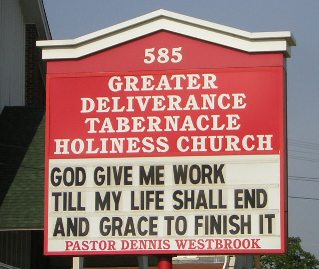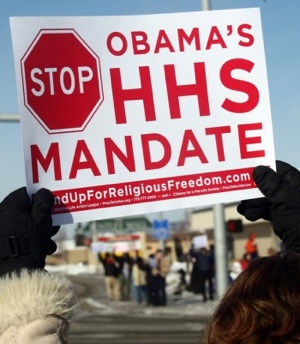I don’t know if Mitt Romney really believes that 47 percent of all Americans will never have a sense of personal responsibility, will never “care for their lives.” How can anyone think such a thing let alone speechify about it? I also don’t know if he truly believes that one man in America is amassing the power of government to persecute its citizens just because they’re religious. But in an ad last month, the GOP nominee renewed this line of attack on Barack Obama. He and his surrogates have continued to argue, with a wary eye toward the administration’s birth-control mandate, that the president is waging a “war on religion.”
There’s certainly a culture war over religion, and it has apparently come to my quiet neighborhood in Andover, Mass. Walking back from town the other day, I noticed a blue and white sign on a front-porch railing that read: “Stand Up for Religious Freedom.” It’s part of a national campaign targeting this alleged jihad against people and institutions of faith.
I’ve known my neighbors to get up in arms about pressing matters such as parking restrictions and overgrown trees, but this was a bit of a surprise for me. The debate over religious freedom in America has been one of the oddly unexpected features of the 2012 elections. If it were a reality show, I’d be grateful to see a news bulletin break in: We interrupt this broadcast to report that there are people in the world who are actually suffering religious persecution, and not one of them lives in Andover, Mass., or any place like it.
John Allen of the National Catholic Reporter provided such a public service during a forum at Boston College this past April, titled “Is Religious Freedom Under Threat in America?” As the forum’s moderator, he interrupted the panel discussion—entirely about the domestic squabble—to point out that an estimated 150,000 Christians die each year in religious violence in places like Egypt, Nigeria, and India. “In the past hour, 17 Christians have been killed on this planet,” Allen reported, extrapolating from the average toll.
Allen committed the faux pas of talking about actual religious persecution abroad, when he and others on the panel were supposed to be speaking seriously about dubious religious persecution at home (and they did speak seriously and thoughtfully on the subject, from different perspectives).
I hesitate to add that I wrote an article about that forum for Boston College Magazine, and my paragraph on Allen’s intervention was edited out—for perfectly sound editorial reasons, I’m absolutely sure. But it’s just another indication of how the issue of religious freedom has been domesticated. In some hands it has become a political football.
More about this in a month—when thousands are expected to take personal responsibility and turn up in Washington for an October 20 “Stand Up for Religious Freedom” rally. Undoubtedly there will be some 47 percenters among them. …read more








